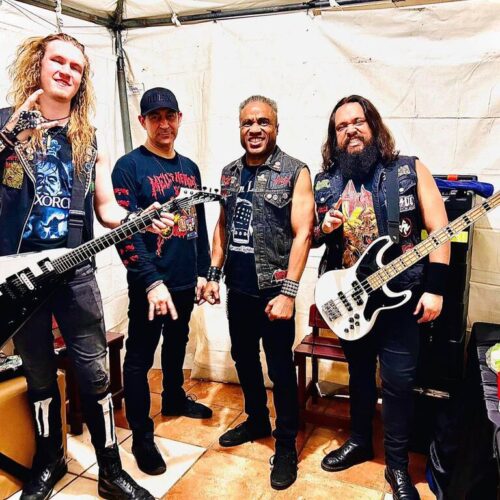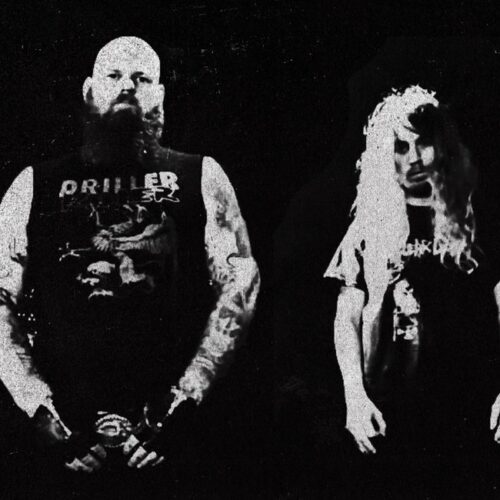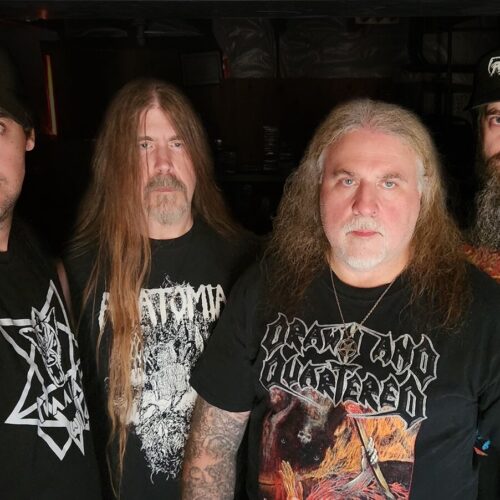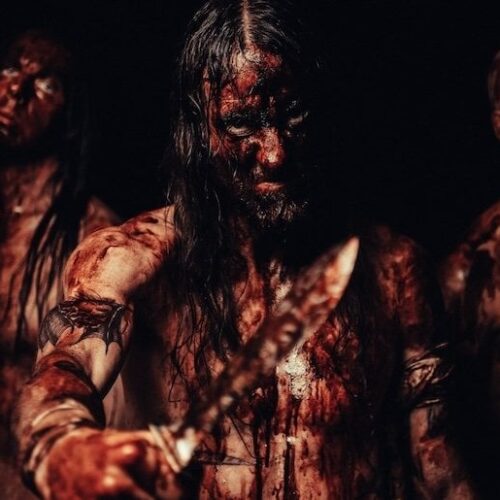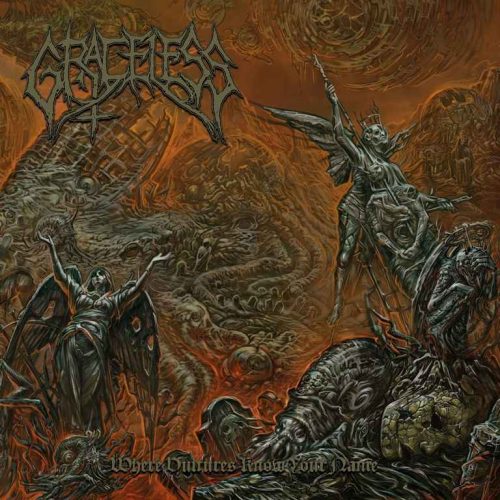Voices From Underground – Interview with Metal Journalist Matt Coe
Matt Coe I have known since like forever from the various writing he did for various fanzines over the years and more recently on Facebook.
Matt Coe I have known since like forever from the various writing he did for various fanzines over the years and more recently on Facebook. I thought it would be fun to take a trip back in time with him to interview him and he agreed and so sit back and read this great interview.
Where were you born and where did you grow up?
MC: I was born in north central Massachusetts in a small city called Gardner, MA. At one point in time it was best known as the chair city, and had the world’s tallest chair near the main area. I grew up in the next town over Winchendon, Massachusetts. It was a very small, tight knit town of 6,000-7,000 people. I enjoyed the community and had a decent amount of friends as I lived in Winchendon all through elementary, middle school, high school and would be there after college as well.
What sort of kid were you growing up?
MC: I definitely was academically inclined. My parents encouraged me to apply myself in school. I gravitated to math and science- so much so that I was pushed quickly up the ranks in math and by 5th grade was doing algebra independently of my classmates. I would say I was shy until I really got to know people, but had a small group of friends due to my interests in music, bowling, and reading mystery books
What did you want to be when you were growing up? Did you have a lot of friends?
MC: When I was growing up, I had a strong desire to write and express myself through words. Since I loved reading mystery books, I always thought I would be an author, but I also would tutor and help students with academics so being a teacher of some sort seemed like a possible career move as well. I did have a small circle of friends between peers in my neighborhood and my interests in bowling, academics, and music. Some of my friends were in my grades and others were a year or two older than me. I worked hard at being a good friend and a great listener, which many of my friends appreciated and are still friends 30-40 years down the line.
So now, what was some early music you heard? Was it AM radio like I heard a lot in my early years in the 70’s?
MC: My parents loved music and had a stereo in the living room with a record player and an 8 track player built in together. My dad played guitar in a country cover band and my mom bought us an organ that we would take turns playing. The radio would be a constant for car rides – first AM radio in the mid to late 70s and then FM radio took over. I remember hearing a lot of 50’s and 60’s artists, Elvis, The Beatles, Conway Twitty, Little Richard, Chubby Checker, Johnny Cash and so forth. I was hooked immediately and got a second hand record player and started buying vinyl with 45’s and albums at yard sales and flea markets which were in my budget from my weekly allowance. I remember buying records from Billy Joel, Elton John, Cheap Trick, Hall & Oates,REO Speedwagon, Boston, Toto and others.
I’m right on board with you Cheap Trick, REO Speedwagon, Boston, etc. Now how did you discover hard rock like Van Halen, Ted Nugent, etc?
MC: I discovered hard rock when I was 10. I had friends who loved bands like AC/DC, Van Halen, Judas Priest, UFO, Thin Lizzy, and Saxon. They would expose me to albums like Back in Black, Highway to Hell, Stained Class, Van Halen I and II, Jailbreak, Strangers in the Night, and I was hooked. Loved the heaviness of the guitars, the solid rhythm section mechanics, the high pitched vocals, and I wanted to delve more and more into these bands. I would pester friends and cousins who knew more about the bands and music to fill my head with knowledge and read copies of Circus and Creem magazine. There weren’t many radio stations playing these acts at the time, so word of mouth and raiding other people’s record collections expanded my tastes the quickest way.
Did you watch MTV much, what videos caught your eyes, and ears back then?
MC: MTV was amazing when it finally came into my life in 1983. Back then, they would show a variety of bands – one minute you would see Michael Jackson, Duran Duran, Prince, and Cyndi Lauper, and then hear and see Dire Straits all the way to Dio, Ratt, Accept, Night Ranger, and so much more. It was at this time that I started gathering a bigger record collection and with my best friend Mike Caouette we pooled our stereo equipment and resources together to deejay local youth dances and parties. Which led to a lucrative business that we kept going for over 20 years together. Special videos that I remember include Billy Jean, Hungry Like the Wolf, Karma Chameleon from Culture Club, The Last in Line from Dio, Wanted Man from Ratt.
Now were there any cool record stores you could go to buy records/tapes? Where did you go and purchase copies of Creem and Circus? Did you read any other magazines at the time? I was a big fan of Mad and Cracked magazines?
MC: I had the best of both worlds when it came to record stores. There was a local music store chain called Music Forum that was in downtown Winchendon that got a great selection of vinyl and tapes, and a semi-big New England chain called Strawberries in a mall 30 minutes away in Leominster that would stock a lot of imports and heavier titles. I would buy copies of Creem and Circus at Joseph’s and Slavin’s, both pharmacies and small mom and pop stores that had a good selection of magazines. I would also be a faithful buyer of Billboard magazine during my high school years to keep up for the deejaying business that was growing for us. I enjoyed humorous magazines like Mad and Cracked as well. I enjoyed comic strips growing up like Peanuts, Hi and Lois, as well as a serial comic called Gasoline Alley. I would cut them out of the local newspaper and make collections of them to keep as reference material for myself.
Now were you a fan of any sports during this time? I was totally into wrestling, football and hockey myself. I also had a Strawberries record store in a local mall.
MC: I was an avid baseball fan. The Boston Red Sox were my favorite sports team with players like Carlton Fisk, Dwight Evan’s, Jim Rice, Carl Yastrzemski, and others. My father would take my older brother and I to Fenway Park once a year for a game. I also loved watching football with the New England Patriots, even if at the time they were a horrible team. I also have been a bowler since the age of 4. Our town had a small 12 lane center that was the main entertainment for the town. My parents bowled six nights a week in leagues, so I learned the sport at that age and started bowling in leagues when I was 6. I still bowl competitively in leagues and tournaments today. I currently average 225-230 depending on where I bowl, and have bowled 15 sanctioned 300 games plus 8 sanctioned 800 + series, 848 being my high. Evans…Also we were baseball card collectors. At one point we had complete sets of Topps cards from 1970 to 1986. Over 25,000 cards I would say.
Wow that’s fantastic. Now we move onto our love of metal. What were some of the first bands you heard and became fans of? Are you still fans of these bands today?
MC: In 1983, metal changed the game for me. I specifically remember visiting two friends up the street who professed their love for Kiss and Iron Maiden. I saw the artwork for Piece of Mind with Eddie, and then they played me the first notes of the Maiden Japan EP with Running Free and it was game on for me. I was a major league Iron Maiden fan from 1983 on. My first Iron Maiden purchase was The Number of the Beast. They are still my ultimate metal band today, seeing them live for the first time in 1985 on the Powerslave tour and I saw them last summer in 2019 for the 7th time. From there I caught on to more albums from Accept, Fates Warning, Judas Priest, Saxon, Def Leppard, Krokus, and eventually Metallica which would be another game changer. And yes I still am a fan of those early bands I enjoyed when I was 12-13 years old. I never thought they were passe or weak, even as I listened to heavier and faster material.
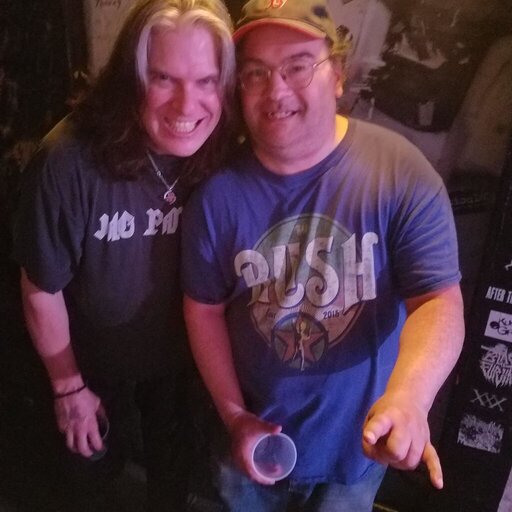
What are your thoughts on Metallica these days?
MC: Metallica to me has the right to do whatever they wish as far as their musical direction. Obviously I regard the 80s albums as their best work, and they started to lose significant interest for me around the release of the Load album. I remember being the first person in my circle of friends to buy Ride the Lightning in 1984 and play it for my friends. They initially could not handle the speed and intensity, but within weeks we all championed the band’s sound and looked for more thrash by Megadeth, Anthrax, Exodus and more. I went to many Metallica shows and still believe they are the last of the major stadium headliner metal acts we will see or hear in our lifetime.
So now, to backtrack, how did you end up discovering the underground side of metal?
MC: Back in the mid 1980’s there was a national metal magazine called Metal Mania (not the fanzine run by Ron Quintana). They did an article on tape trading. I wrote a letter to the magazine talking about the article and wanting to be a part of the tape trading community. I only had a couple of local Mass demos at the time and live bootlegs from Metallica and Iron Maiden to trade. My letter would be published in the magazine with my mailing address. I received over 100 responses to tape traders in the US and across the globe and that started accelerating my tape trading and underground collection with demo,live bootlegs, and unreleased tracks. I would be an active tape trader from 1988 through 1996.
So was thrash and power metal something you took to right away. Have you ever gone in pit or stage dove?
MC: Once traditional metal captivated me, I was always searching for something heavier and faster. Thrash and power metal fit that bill. Bands like Jag Panzer, Queensryche, Heir Apparent, Rage, Helloween, Liege Lord, Omen, Cities, Hallows Eve all the way through to the big four of thrash and their offshoots like Overkill, Sepultura, Dark Angel, Flotsam and Jetsam took over. I would consistently be buying 2-3 new metal albums weekly and borrowing from friends growing collections. Believe it or not I never got involved in pits of stage diving. I preferred keeping more to myself at live shows, screaming and headbanging along in my own way.
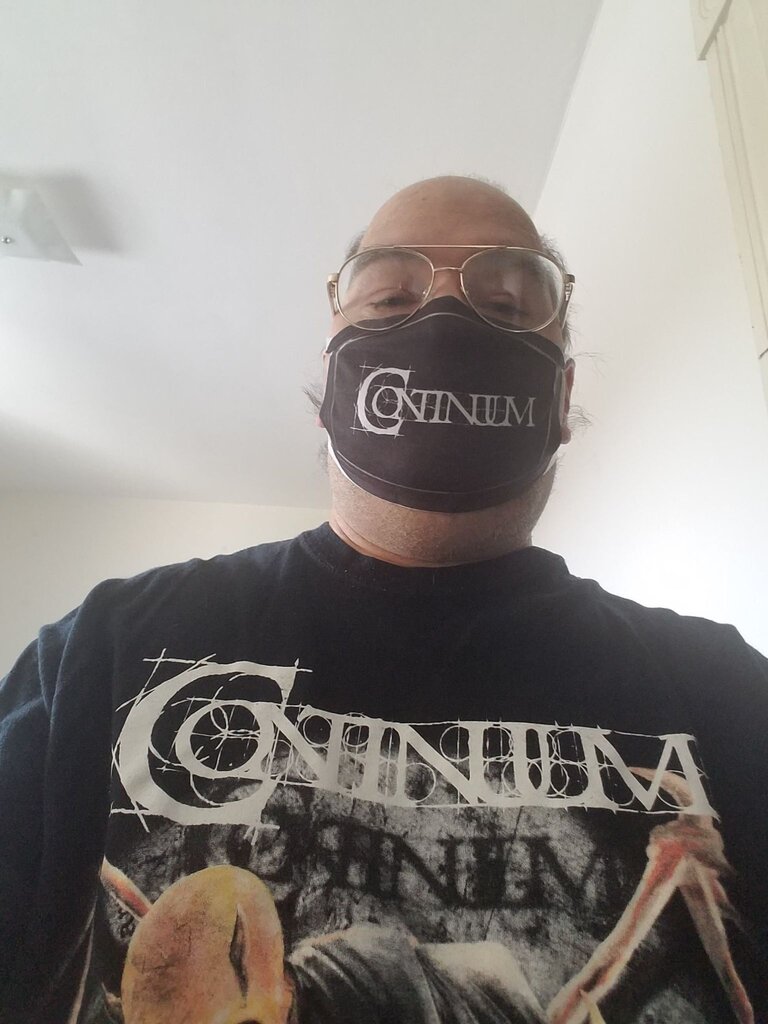
Now when did you discover the lovely world of fanzines? What did you think of them when you read one?
MC: The first fanzine I read was the first issue of Curious Goods back in 1988. Jerry Rutherford was a co-editor and he was the second person to reach out to me to my tape-trading letter published in Metal Mania magazine. He told me they were developing the first issue, which I bought, and I couldn’t believe the mix of local, national and international metal coverage. I would purchase many demos from the VA/DC scene from them – this was the first time I learned about Deceased for instance during their demo days. I love reading fanzines, he new interviews and broader spectrum of releases out there. As a result, Jerry asked me to contribute to the fanzine starting with issue three and that started me on the path to writing which has continued for 32 years.
Now did you do any interviews for Jerry or only reviews?
MC: I started with reviews of demos and albums he would send me in the mail – about 20-30 different items at a time. I felt like it was Christmas when those big boxes would arrive in the mail. Back then, of course, it was pre-internet so I would have about a month to write up my reviews that I would send him typed out. I started doing interviews in the early 90’s for the magazine, including talks with Mike Portnoy of Dream Theater, Jon Schaffer of Iced Earth, and talks with Forte and Demolition Hammer among others.
Looking back do you think your reviews were pretty fair?
MC: I believe back in the early days, I was afraid to be super critical. I would listen to items at least five to ten times before writing up my thoughts. If I felt the songwriting was predictable or the production wasn’t that great, I would call out bands on it. I felt at the time that unsigned bands needed a bit more constructive criticism to improve and get better. I think we often look back to our first writing and cringe at some of the things we said or way we word things – you continually strive to get stronger and better through more listening, as well as more reading and writing. I definitely paid attention to writers at Metal Forces (Rob Clymo, Borivoj Krigin),Metal Mania (Jeff Kitts), and my fellow fanzine writers like Jerry Rutherford, Brian O’Neill, Doug Wilhelm, Ula Gehret, Jeff Wagner, and others.
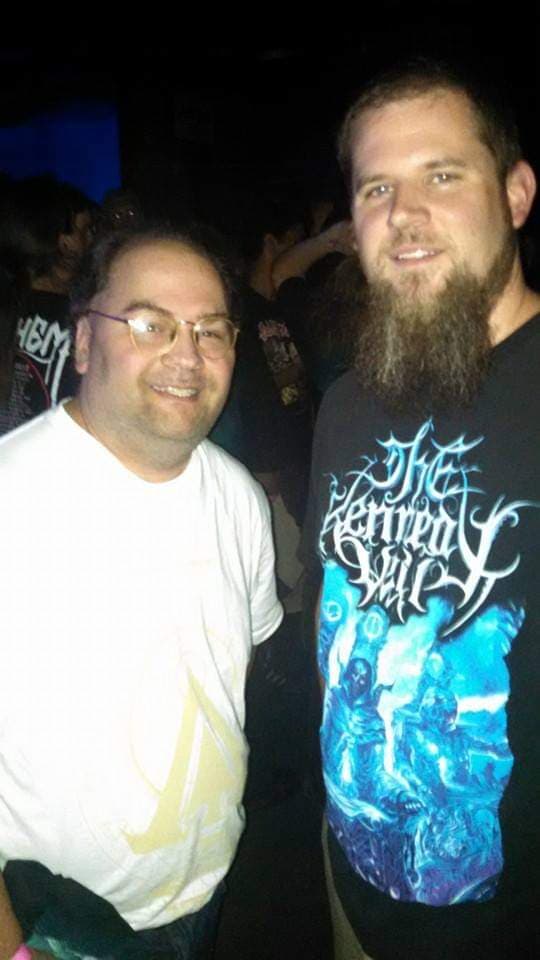
Did you ever throughout the years start of thoughts up your own zine?
MC: I went to college from 1989-1993, so I knew between all of the academic hours there, bowling for the college team, which would take up a lot of my weekends, and having any sort of part-time job would take up most of my time beyond contributing to fanzines. So that’s why at that time I chose to just contribute to fanzines like Curious Goods, Comedy of Errors, Symposium, and G.A.S.P. Etc. during that time period. I did want to start a fanzine, but felt I needed to do so with a strong partner, which is what would happen around 1993 with Spectrum and Rob Smith, bassist of the Mass power metal band Crawlspace.
So how long did you contribute to Curious Goods?
MC: I contributed to Curious Goods for 3 years. I loved the staff and the diversity of heavy music that we covered. Most of the writers had specific niches, and mine were more geared towards traditional, power, speed, thrash, and progressive metal. I love getting the new issues in and reading them cover to cover to continually expanding my horizons.
Thoughts on these musical styles
Pure heavy metal:
MC: Probably my favorite style. Iron Maiden is my all-time favorite band, so I grew up wanting to learn and ingest more of the original wave of heavy metal from the UK that eventually made an impact on the USA and the rest of the world. Acts like Raven, Tygers of Pan Tang, Angel Witch, Blitzkrieg, Saxon, Venom, Judas Priest, Diamond Head, and so forth are an important part of how I view the genre.
Power Metal:
MC: Another of my favorite genres. Rainbow obviously are the godfathers of the genre. Helloween took things to another level with their musicality and speed plus the higher octane vocal range when Michael Kiske joined the group. I have an equal affinity for US power metal like Cities, Liege Lord, Metal Church, Omen as I do for many of the European bands like Helloween, Lost Horizon, Hammerfall, etc.
Um Hair Metal ha ha:
MC: Well… let’s see. Prior to the traditional metal and thrash explosion in junior high, it’s all we were really exposed to. So…there were some aspects of the early albums of bands like Ratt, Motley Crue, W.A.S.P., White Lion, Dokken, and others that I enjoyed. When they focused more on the music and less on the image and ‘lifestyle’, things worked better for me. There are still bands from that era that I feel had solid songs and a decent style – Dokken, Skid Row, Tesla, Firehouse among them. Others though it started getting ridiculous when it was a carbon copy of what had already been paraded out there 4-6 years earlier – thus I wasn’t surprised that many of these bands died when grunge hit the scene in 1991-92.
Thrash Metal:
MC: Metallica was another game changer for me. I heard Ride the Lightning in 1984, and I was on for much faster, heavier songs and bands. We would discover Megadeth, Anthrax, Slayer, Exodus, Dark Angel, Death Angel, Kreator, Destruction, Sodom and hundreds of others. I remember seeing Anthrax on the Spreading the Disease album when they supported Black Sabbath and blowing them off the stage. My first interview ever was with Bobby Blitz of Overkill in 1989 during the Years of Decay promo cycle. It’s still a genre I follow very strongly today – both for the old school bands and new crop that are coming up the ranks.
Last one is death metal.
Mc: Death Metal was exciting in its infancy. Had discovered a lot of that style during my tape trading years – bands like Carnage (Entombed), Dismember, Grave, Suffocation, Cannibal Corpse and others. It took a little bit to get used to the gutteral vocals, but once I understood their purpose I was fine with it. I started to get burnt out in the style when too many ‘clones’ took shape – a lot of people trying to follow either the early Swedish sound or were mirroring Cannibal Corpse/Suffocation in approach and execution. You still need separation and individuality even in extreme genres. I would say I’m pickier about this genre in terms of bands, albums, and releases than many of the other genres I love.
So how was the scene back then as far as shows and clubs? Did many tours come through your way back then?
MC: Back in the 80s I went to mostly arena shows, due to not having a driver’s license or car until 1987 for the driver’s license and 1989 for my own car. Most of the club scene for metal was in Boston. I would go to arena shows in Worcester, MA at the Centrum. I saw Iron Maiden on the Powerslave, Somewhere in Time, and Seventh Son tours. I also saw Black Sabbath, Judas Priest, Anthrax, Ozzy Osbourne, Van Halen, Metallica, Whitesnake, Def Leppard, Queensryche, and Boston among others. My father was kind enough to drive me and my friends to shows as I could afford to go to them – saving allowance money plus working part time in a cafeteria. We would get all of the regular arena tours for metal in Worcester, so I was going to usually 1-2 shows a month.
What was the first underground show you went to?
MC: The first underground show I went to was an all local metal bill in college in 1989. Club Surrender in Waltham, MA. It was a three band bill, a thrash band from Lowell called Demise, a thrash band from New Hampshire called Atomicaust, and a crossover hardcore/metal band from Lowell called Hearing Impaired. There were 200 people packed in this small basement type venue and the energy from the crowd to the stage was amazing. I bought all three bands demos on the spot and wanted to go to more shows from there. Had car, gas was cheap at around a dollar a gallon and I would go everywhere around New England for shows. This is where I would see everyone from Wargasm, Psychosis, Sam Black Church, Only Living Witness, Crystal Myth, Seka, Deslok, Triphammer, and Auditory Imagery. For signed bands, my first underground show would be Devasation, Malevolent Creation, and Demolition Hammer at Club 490 in Fitchburg, MA. Unfortunately only DH played as they had a second show booked that night in another part of the state, and had arrived late for this afternoon show. But it was so powerful seeing Demoliton Hammer support their debut album in a live setting.
So when you decided to write did you have any idea what you were doing except for your passion about this style of music?
MC: In school, I always had a desire and passion for writing. Being an active reader I think expanded my vocabulary and I loved expressing my thoughts on music. I think initially when you write you grab influences from other writers and try to mirror what you enjoy. So writers like Borivoj Krigin, Rob Clymo, Bernard Doe, Jeff Kitts shaped my thoughts on specific bands and genres. Then you started reading fanzines and see great writing on that level from people like Ula Gehret, Jerry Rutherford, Jeff Wagner, Marco Barbieri, Ed Farshtey, Sue Verica, and so forth. A lot of trial and error at first but relying on my years of metal listening, a big collection of albums, and the desire to turn people on to great bands while also helping them navigate the less than stellar releases.
So I am not sure all the fanzines that you wrote for and I’ll assume you never got paid as it was a love of metal time of thing, am I correct?
MC: That is correct. I have never made any money as a contributor to fanzines and the ones I was editor or co-editor for (Spectrum in the mid to late 90s, Snakepit during the early 2000’s). I contributed to Curious Goods, Comedy of Errors, Symposium, Ill Literature, Depth of Pain, and G.A.S.P Etc. among others. There may be a couple of others I am forgetting. I felt it was just my way of contributing to the scene by writing about metal, reviewing bands, interviewing musicians and spreading the word to the underground to hopefully turn people on to more heavy metal.
I’m gonna go over each fanzine you did tell me about your time doing Curious Goods and how much fun was it for you back then?
MC: Curious Goods was amazing. Jerry Rutherford was a co-editor with Brian O’Neill. They originally lived in the Maryland/Virgina area, but by issue two Jerry moved out to Oxnard, California so they were able to get a deeper reach on the West Coast scene. I started writing for them with issue 3 and continued until the end of the magazine which was issue 11 I believe. I got the chance to do an average of 20 reviews an issue between demos and regular releases, plus 3 to 4 interviews. I got the chance to interview Demoliton Hammer, Iced Earth, Only Living Witness, Dream Theater, Forte, and a slew of others. There was nothing more exciting than getting a big box of promos from Jerry to tackle for the next issue. I would try to do all the write ups within four to six weeks, which was a juggling act given my college schooling, bowling events for the team, and work, but it was a labor of love so I carved out the necessary time to do the best job possible. We all wanted to learn more and discover more. That’s how I learned about acts like Faith No More, Kyuss, Pantera, Wrathchild America, Dead Horse, Last Crack, and Mind Over Four.
Since this was your first time writing for a fanzine, overall how do you think you did? Do you think your reviews were fair and do you have original copies of all the issues you wrote for?
MC: Unfortunately in all of my successive moves in adulthood the bulk of my fanzine writing did not go with me. I do have copies of my writing in Snakepit magazine though for myself to treasure. I think my writing with Curious Goods was average at first and got stronger over the years. You have more comfort and vocabulary as you engage more with the material. They often say good readers can be great writers. I paid attention to craft, structure, often using less to say more if possible and be descriptive without being verbose. If I didn’t like something, I would be critical but constructive. No sense name calling when it didn’t serve a purpose for the artist to get better at the songwriting, originality, or production values.
So how did you get the job or rather how did you start writing for Comedy of Errors?
MC: I started writing for Comedy of Errors because another tape trading friend Doug Wilhelm was a co-editor. I contributed to three issues 3-5. Again got the chance to review a few demo and album
releases especially of the traditional, power, progressive and thrash realms. Ula Gehret had a great wit and sense of humor in his reviews. His style was amazing and I knew he would get the chance to showcase his skills to a national audience which he did with Metal Maniacs, Terrorizer and others including Decibel. I learned about the awesome Psychotic Waltz through this publication.
How about Symposium. Wasn’t that put out by Jeff Wagner if memory serves me correct?
MC: Yes Symposium was an offshoot from Curious Goods contributor Jeff Wagner along with a co-editor Michael Hope. Jeff was great at the little details of interviews and had diverse tastes which I enjoyed during the 1990s. I believe I started writing for them with issue 3 and contributed to 4 issues with reviews. It was the precursor for his move from Iowa to Pennsylvania to join the staff of Relapse Records, and eventually a co-editor at Metal Maniacs magazine. It was interesting to watch a lot of my fanzine friends and writers gain great positions in the metal scene later on in life.
Tell me about writing for Depths of Pain.
MC: Depth of Pain was another fanzine run by a tape trader friend of mine Brad Norris in Kentucky. He knew by this point I was a writer for other fanzines so he felt that I could help him get more contacts and material to review. I wrote for 3 issues, and he had great passion for the thrash and death genres. Plus, there weren’t many fanzines coming from Kentucky at the time, so I got to learn more about their underground scene.
Did you ever toy with the idea of starting up your own zine? If so how far did it go? Were bands by now knowing who you were just sending you stuff personally in the hopes of getting a review?
MC: Due to my college schedule with academics, bowling, and deejaying for my side job, I didn’t feel I had the proper time, energy, and resources to develop my own fanzine. Thus in the mid 1990s when Rob Smith offered me a co-editor position at Spectrum, I had more time available to do this. Bands at that point were sending me items not only for the fanzines I was writing for but I had another underground service with Gerry Saracco from NY called Urban Warfare Productions. We helped unsigned bands get coverage through fanzines, college radio, and distributors who would sell their demos. We by this point had amassed a healthy network of contacts here and abroad. As a result of this service a couple of bands signed record deals including Winters Bane and Psychosis.
Now how did you come to write for the godly Snake pit magazine?
MC: Through my national and international dealings at Urban Warfare Productions, I came in contact with many magazine people from Europe. One that I was in regular touch with was Detlef Dengler, a major writer at the German Metal magazine Heavy Oder Was! (Translation Heavy or What?). He told me that former Voices from the Darkside editor Frank Stover was starting a new magazine dedicated to traditional metal and their offshoots called Snakepit. I bought the first issue and was hooked. He was looking for additional contributors, so I was recommended. I started writing for them with reviews and an Axehammer interview with issue 3. When Frank was going to stop the magazine with issue 4 due to a heavy workload, three writers Laurent Ramadier, Heinz Konzett, and myself pooled money together to become co-editors with issue five and continue it forward. I stopped my co editing duties with issue 12, as did Heinz. It was becoming too much work and the physical marketplace in the states was changing trying to get consistent sales for the magazine. I love my work with the magazine. We did long in depth interviews and honest reviews of not just the present bands but a lot of the past. We were willing to cover Omen for 8 pages and track down 3 to 4 members to get as much of the real history as possible. A lot of times we astounded the musicians themselves with our knowledge. We wanted to show the passion and appreciation for these artists.
What was your favorite interview you did while writing for it? Any bands you know of refuse to do to an interview or just a major disappointment in your view?
MC: My favorite interview would probably have been Greg Fulton of Znowhite/ Cyclone Temple. We did a 3 1/2 hour phone interview. Man did that take forever to transcribe. I also enjoyed talking to Michael Spencer and Debbie Gunn about Sentinel Beast and their time in other bands. There were many bands unfortunately that didn’t want to talk about their past. Or certain members that gave one line answers. I know that Laurent did an interview with Algy Ward of Tank for issue 4 that was two pages even though Laurent asked at least 60 questionsabout their history. If we were super critical about certain bands, even their new album, they would refuse to do a talk. I never had any bad talks really at Snakepit, my worst talk ever was with Phil Rind of Sacred Reich just before the Heal album came out when I was at Spectrum. He answered 15 questions in 10 minutes, acted like he would rather be anywhere else than talking with me. I printed what he said word for word.
I hate when bands like Sacred Reich for example, you don’t like their new release, but love the older stuff and want at least talk about that too, but they don’t see things that way. Lots of bands from back then put out disappointing releases by release 3 or 4.
MC: Agreed. And in the case of Sacred Reich, they moved back to Metal Blade from being on a major label at that point. But if your record company sets up the talk to push your release, I think you should always be professional in your interviews. If you are not in the mood to do it that day, cancel and reschedule for another.
Agreed. Now was there any bands back then that you enjoyed or somewhat enjoyed even though they changed musically?
MC: Sacred Reich does come to mind in that regard. Love everything from Ignorance through The American Way. When they went to Independence and had more of that groove/Pantera aspect to their music I handled it better than most. Cyclone Temple I loved “I Hate Therefore I Am”, and they also changed singers and got more groove oriented with follow up releases. But I always respected guitarist Greg Fulton for his talent and his desire to change things up. A lot of thrash bands went softer with their later releases. Testament with The Ritual comes to mind the most. Then by the end of the decade they went full throttle with The Gathering. I mean even Iron Maiden with Blaze Bayley in the mid 90s changed from the Bruce years.
I mean even in the death metal years I remember Entombed catching a ton of flak for Wolverine Blues after the massive underground success of Left Hand Path and Clandestine. I didn’t mind a little rock and roll infused into their death platform.
With these bands being on major labels like Raven, Kreator, Testament. etc I sense the pressure from the label to sell records as a result of Metallica’s success. What are your thoughts.
MC: Very much so. All of these bands in reflection would agree that there was a lot of pressure at that time in the 1990s to make a Metallica-like breakthrough. I mean Atlantic thought Testament selling 200,000 copies of Souls of Black and The Ritual stateside was a failure! They were releasing an album a year and touring four to six months a year. I remember that Eric Peterson admitted they didn’t have much time to get Souls of Black together as the Judas Priest arena tour was already booked. It’s like these labels signed the band for their music then wanted to change them around a bit to sell more copies and often these bands lost a bit of their fanbase and integrity as a result.
That’s why I think some fans bailed and turned towards death metal. Your thoughts.
MC: 100% agree. Metal fans at that point were looking for something heavier, true to form, and brutal. Death metal provided that outlet. For many it took some time to get used to rougher growls and rhythmic patterns, but I believe it’s why Morbid Angel, Suffocation, Cannibal Corpse, Immolation, Entombed, Grave, Unleashed, Dismember, and others gained more attention than thrash at that point in time.
Now Metallica. Opinions on the debut (Kill Em All) and the “Black” album and when did you bail on them, if you ever did?
MC: The 80s era of Metallica is where I discovered them and fell hard for them. The first four albums are untouchable as far as a master class in songwriting and execution. They were writing ballads back with Fade to Black on Ride the Lightning, that still had integrity. Solid instrumental skills, diverse tempos, speed songs, heavy songs, they had it all. Master of Puppets is probably my favorite of those albums. I knew with the black album they were going the more commercial route. There are still some great songs on there, but I definitely got burnt out at hearing Enter Sandman every five minutes on MTV and the radio. They went from the underground to superstardom on one record. I checked out Load but by that point I was deeper into my traditional routes, buying imports from Symphony X, Grave Digger, Gamma Ray, Rage, Axel Rudi Pell, and Blind Guardian. I still love the old stuff, and will buy the newer material, but I would have to say I am not following Metallica as much as I did from 1984-1993.
Thoughts on Slayer:
MC: I got the chance to see Slayer at the Milwaukee Metalfest just before Divine Intervention hit the streets. I would also attend the last Mayhem festival where they were the headliners. The first five albums from the Slayer discography are very important to my views in thrash. Reign in Blood is definitely a top 5 thrash album of all time. The intensity, the wild lead breaks, the energy, the passion for the genre are hard for other bands to capture for such a sustained period of time.
Thoughts on Megadeth:
MC: Megadeth were awesome in the 80s to early 90s. Peace Sells But Who’s Buying as well as Rust In Peace are stellar records. Dave Mustaine is an exemplary songwriter and master guitarist. I got the chance to see them open for Judas Priest when supporting Rust in Peace as well as headlining with Korn, Flotsam and Jetsam, and Fear Factory in the mid 1990s. Still respect them today, although Risk should never have been released under the Megadeth name. But they still deliver live and their last studio album gained a lot of critical and fan acclaim.
Anthrax. Did you get into the whole “NOT” nonsense and the rap crap with Public Enemy as I myself hated it and I moved on.
MC: Anthrax would be the first thrash band I would see live supporting Spreading the Disease opening for Black Sabbath. Love the 80s albums. Did not understand their need for the Bermuda shorts and the rap/metal infusion. Loved the Bush-era records too with the band. I got to see them live at least 6 times over the years. With Bush and Belladonna. Favorite albums would be Spreading the Disease, Among the Living, and Sound of White Noise. Got the chance to interview Charlie Benante years back and it was great to catch up on the history of the band.
Thoughts on Raven and Celtic Frost?
MC: Raven I was a huge fan of back in the Rock Until You Drop and Wiped Out days. Was not thrilled with the commercial changes on The Pack Is Back for sure, but loved the Mad EP and Life’s a Bitch albums. Still follow their work today love Metal City that came out this year. Have seen them live four times over the years always entertaining and put on a killer show.
Celtic Frost…oh boy. Loved the early stuff. Didn’t mind Into the Pandemonium with the extra added elements and the Mexican Radio cover I thought was very entertaining. When Cold Lake came out, myself and most of my friends thought this was the biggest sell out in history. Between the glam image and softer, more commercial songs, it was not what we wanted from that band. I forever treasure those 80s efforts outside of that.
Did you ever entertain the thought of working at any record labels over the years? Were you offered a job at one?
MC: I never entertained the idea of working at a record label because most by the 1990s had moved away from NYC into California. I have lived in New England my whole life and enjoy the four seasons and pace of the East Coast. There was one chance when Sue Verica was going to step away from Metal Maniacs magazine that she put my name in to replace her, but Jeff Wagner convinced her to stay on board. I have been thankful to write for fanzines and now online webzine since 1989
– I feel it’s my best way to give back to a style of music that has provided so much joy over the years.
Tell me a bit more about Urban Warfare Productions?
Mc: Urban Warfare Productions was an underground promotional service set up by Gerry Saracco from Flushing, NY and myself. We felt a lot of unsigned bands didn’t have the proper contacts to get their material into fanzines, college radio playlists and tape sales overseas as well as here in North America. So we would charge monthly rates based on the number of units they wanted to do per month, collate all the press clips and playlists, aid them with distributor sales, and get as much promotion and publicity as we could. I tended to work with mostly New England bands in a variety of metal styles: Visionary, Psychosis, Nervewomb, Open Mind, Krucix, Infestation, Delusion, Chiefsuckface, and many more bands worked with me during those college years and were very thankful to gain more of a footprint in the international scene.
Out of all the print zines you wrote for, do you have a particular favorite.
MC: The obvious favorite is Snakepit. It’s become one of the most well-respected metal fanzines, and most readers love the detailed interviews and passion that we put in for the genre of metal. It’s a labor of love that stands the test of time, and often we were able to raise interest for bands to reunite, record albums, and play special shows or festivals. The musicians and readers all felt genuine value and respect for what we did, and what Laurent Ramadier continues to do today.
Has any band ever asked you to manage over the years?
MC: I did manage a couple of bands at certain points. One being Nonpoint Factor when they moved from Puerto Rico to Florida. They then changed their name to Nonpoint, met Jason Bieler formerly of Saigon Kick, got signed to MCA and still have a thriving career. Another local New England band I co-managed was die.right.mind. , featuring ex-members of Psychosis and Ruthless among others. I also got the chance to go out on the road with Psychosis as a tour manager and go to the Milwaukee Metalfest one year, the year Slayer headlined before Divine Intervention came out.
So were you sad seeing the old underground sort of fade away with the takeover of the internet and My Space and that print zines sort of fell by the wayside to be replaced by webzines?
MC: Yes I was. As an old-timer and a big fan of metal information in print publications, I didn’t enjoy the shift to social media platforms, message boards, and web zines. It took a little while to get used to physical promos fading away and everything being sent digitally. Eventually I started writing for webzines like Imhotep, Eternal Terror, Blistering, Metal-Temple and since 2013 for Dead Rhetoric. The instant communication aspect is great, reaching out to contacts is quicker, but there was something special about snail mail, reading the latest issue of a fanzine, receiving demos in the mail or getting them at shows, and the face to face contact with pen pals at shows and festivals.
Favorite band and why are they your favorite?
MC: Iron Maiden. From 1984 onward I have loved that band. Great songwriting, killer hooks, melodies, and harmonies. Captivating lyrical content, stellar performances. I have seen the band seven times live and never been disappointed in them. They are a major influence on generations of metal musicians and fans. My dream interview would be to talk to one member past or present from that band before I finish my career. The seven albums they released in the 80s are all world class. To think they were averaging a release a year and touring globally during 1980-1984 is astounding in today’s marketplace.
If you could book a 5 band show, from any era of that band’s career, which bands would it be?
MC: I would book Iron Maiden from The Number of The Beast era with Clive Burr on drums. Judas Priest from the Defenders of the Faith lineup. Metallica from the Master of Puppets era. Metal Church from The Dark era with David Wayne. And Accept from the Metal Heart era.
I notice, at least through Snakepit interviews, after the interview comes out, the band reunion at times, is not far behind. What are your thoughts on that and do you think it’s good or bad for them to record a new record as more times than not, it doesn’t capture that old magic?
MC: This is an interesting subject. There have been many reunions as a result of our coverage in Snakepit. Intruder, Savage Grace, and Griffin come to mind the most. When it comes to recording a new record, if the intent and heart is in the right place you can have a solid record. The new Cirith Ungol comes to mind. More often than not though, the musicians aren’t willing to exercise quality control to determine if their new material is good enough to be released now compared to back in the day. I tend to agree that most bands when trying to recapture the magic fail as it’s been decades since they last hit their creative stride.
So what are you doing with yourself these days?
MC: I write for Dead Rhetoric webzine as a main writer, doing interviews and reviews. I also work overnights at a group home for young adult males with autism that live in apartments. I do my best to go to as many shows as I can. Obviously COVID-19 changed that this year, but hopefully life gets back to normal soon. I also enjoy bowling on a weekly basis.
So what advice would you give to a young band out there?
MC: Work on your craft and write good songs. Originality is hard to come by. Put your own stamp on things. Try to create and engaging and exciting live experience. Whether you are playing for 5 people or 50,000 people, entertain them in a live setting. Accept constructive feedback and work at your craft, daily, weekly, monthly. Set small and large goals and do your best to achieve them.
Matt plug anything you wish my friend?
MC: Thank you Chris for the opportunity to go through my life history writing in heavy metal. I have always appreciated your dedication to the genre. If people want to check out what I’m up to as far as writing these days, Dead Rhetoric is the place to go. We update the site with reviews and interviews 5 to 6 days a week. Metal will never die.


